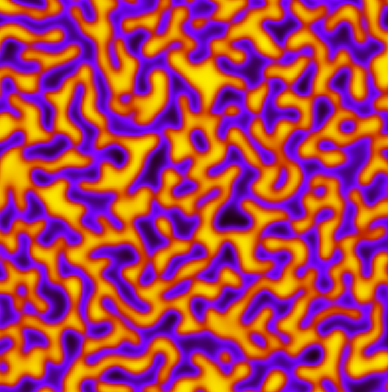 About the Group
About the Group
Professor Mike Cates, appointed in 2015 as the Lucasian Professor of Mathematics, is head of the Soft Matter Research Group in DAMTP. The other permanent academic staff are Dr Ronojoy Adhikari, and Prof. Rob Jack (joint appointment with Chemistry Department). At any time the group has a number of self-funded research fellows and/or grant-funded postdocs, plus typically 5-10 PhD students. The group has recently been awarded a £1.2M UKRI Grant to study Nucleation and Extinction in Non-equilibrium Statistical Field Theories. This will fund two postdoctoral research fellows for the next four years.
Soft Matter includes colloids, polymers, emulsions, foams, surfactant solutions, powders, liquid crystals, and similar materials. Many biological systems involve "active" soft matter which, like life itself, is sustained by a continuous supply of energy. Recently we have also started working on the statistical physics of active matter outside the realm of soft materials, addressing models of nucleation and extinction in settings such as ecology, social interactions, and epidemics.
Using both analytic and computational methods, the group addresses fundamental problems, such as how the basic principles of statistical mechanics are modified by activity; how to coarse-grain dynamics from particle level to descriptions in terms of continuous fields; applications of differential geometry in soft matter; and use of stochastic thermodynamics and large deviation theory to study the statistics of rare events. We also have a track record of addressing more applied issues, such as how to predict the remarkable flow properties and jamming behaviour of dense suspensions.
The mathematical methods used within the group include statistical field theory; exact and approximate solution of stochastic differential equations and PDEs; particle-based simulation; differential geometry; and numerical simulation of continuum field equations. In some areas, as much time is spent figuring out what the proper equations of motion are, as is spent solving them: the field offers great scope for scientific as well as mathematical creativity. We have strong collaborations with researchers around the world.
We welcome PhD applications. An idea of the type of work currently in progress can be seen from the selected publications listed on the staff webpages linked in the opening paragraph above.
Here are some of the areas in which PhD projects may be available:
1. Active field theories on moving manifolds from the perspective of modern differential geometry (Dr Adhikari)
2. Morphogenesis and moving manifolds (Dr Adhikari)
3. Active micropolar elasticity and the mechanics of tissues (Dr Adhikari)
4. Rare events in non-equilibrium classical and quantum systems, using large deviation theory (Prof Jack)
5. Statistical mechanics of pattern formation in active mixtures (Prof Jack)
For more details please contact those named in the first instance. Some of these projects may be jointly supervised. We hope to recruit 1-2 students in total. DAMTP has a small number of UKRI-funded studentships with nationality restrictions; these are awarded competitively within the Department. Other students will need to apply for studentships offered by the Cambridge Trust and similar organizations. Deadlines for all applications are in early January. The application procedure is detailed here .
